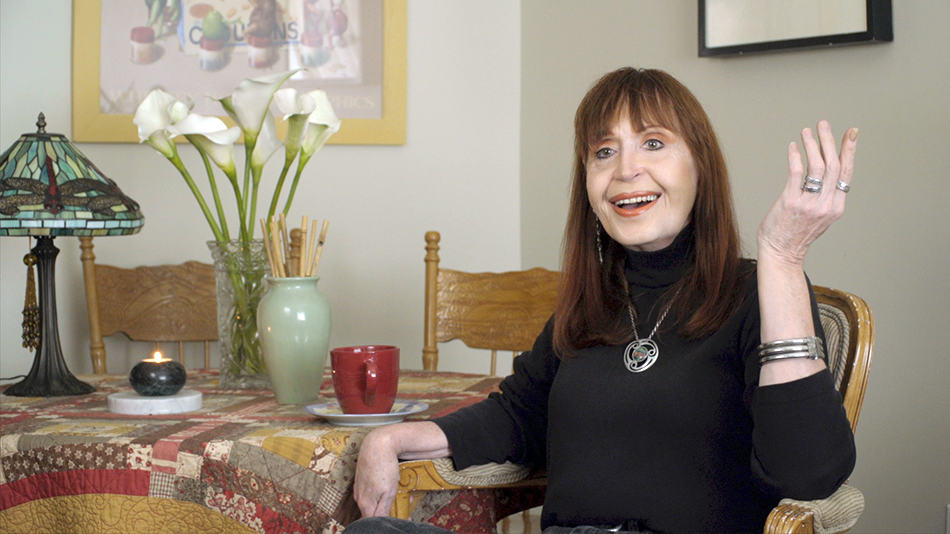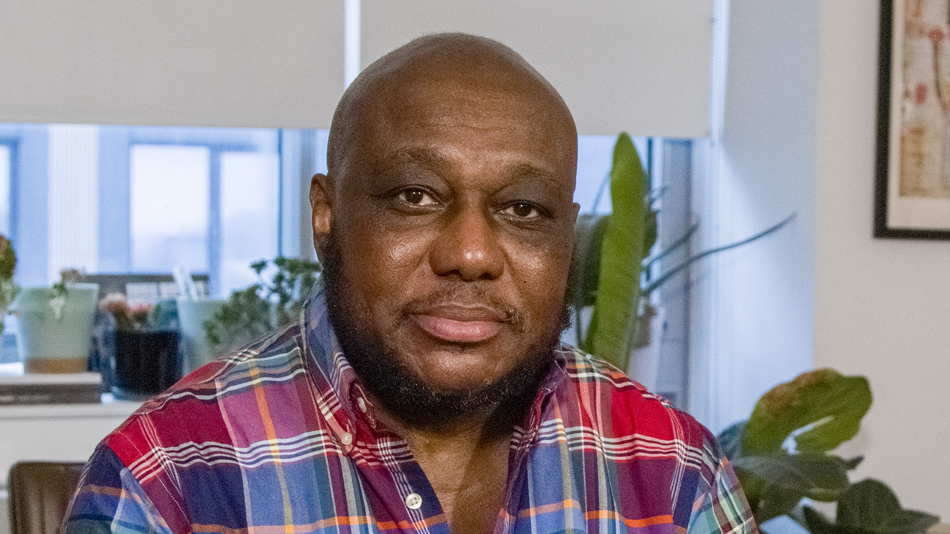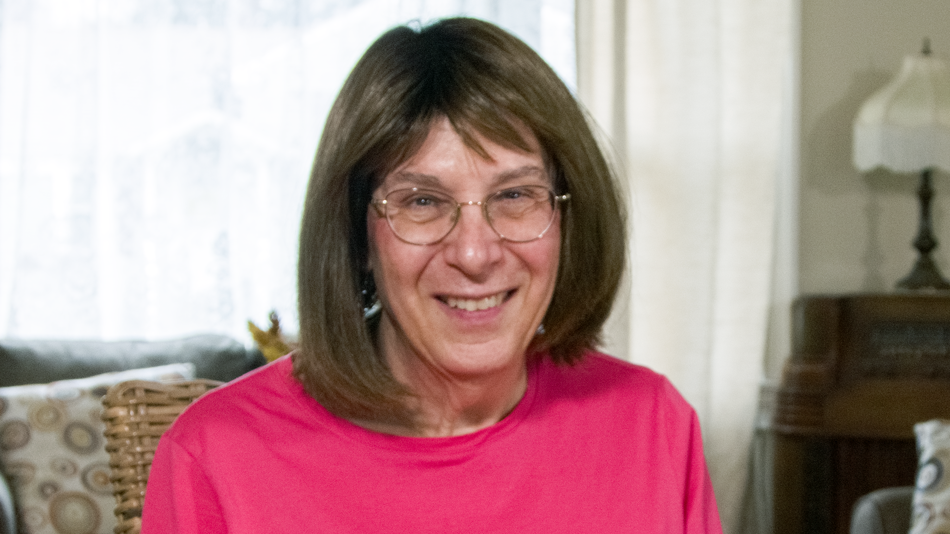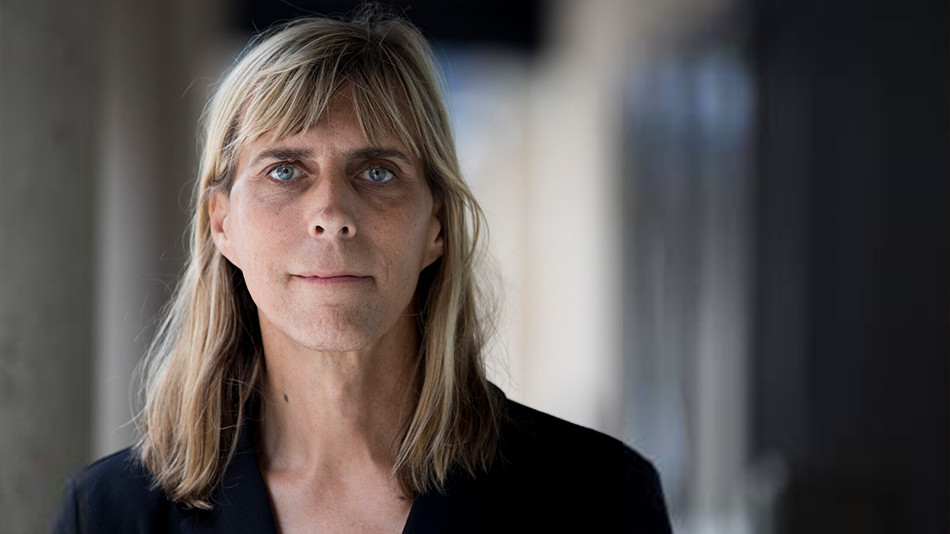
Trans Woman Reflects On Her Journey: “It Was Real For Me And I Was Okay With It.”
Yeah, I was born in Brooklyn, New York, and when I was five years old, my parents moved to Philadelphia. I was raised in Philly and went to school in Philly.
Except for the fact that my hair is a little long and I have a little makeup on, and except for the fact that I’m older, I was born looking like this. When we speak of quote/unquote transition … well, it was the late sixties. Everything was very unisex, if you will.
I don’t really think that I had a really strong grasp on personal gender at all in the beginning. I suppose around puberty, I realized that I was attracted to boys then. Then, I realized that maybe that meant I was gay. And then I remember realizing that I wasn’t gay. Then I thought, ”Well, what the hell am I?”
It’s very difficult to explain why I knew I was a girl. That’s like saying to someone, “When did you know you were straight?” Duh. Or, “When did you know you were a man?” I mean, yes. It might be different. The construct that some women are actually born with penises is something that people have a hard time accepting, but whether they accept it or not, it was real for me and I was okay with it.
My parents carried some shame, because the whole issue, forgive me, came down to something that many of us have dealt with, which is, “But what will the neighbors think?”
I thought, “Great. I’m your kid. I never caused you any trouble. I got really great grades. I didn’t drink. I didn’t get arrested. Why does this have to be so bad? It’s okay.”
“Well, can’t you just be gay?”
Of course, I’d say, “Well, yeah I’d be happy to, if I were. But even if I was gay, I’d still be a girl.”
And it took awhile for it to be okay. My parents sat my siblings down because I hadn’t seen them in a few years. They sat my brothers and sister down to give them “the talk.”
And they all said, “That’s it? You kept us apart because of that?”
And my one brother – the one who was about twelve – found out that I was living in town. There was a knock on the door! And it was my little brother! And that was really great.
Not long after, the rest of them came down. Then my mom came down. My dad didn’t come into town. I went home. And then after that, it was basically fine.
1972: Trans Actress Makes Her Debut In Empowering Scene In John Waters Film.
I first met John Waters peripherally in the basement of a church at the premiere of one of his earlier films, which was called Multiple Maniacs. And it was in a church – yes, it was in a church basement in Baltimore.
I was going to see a movie and everyone else in the room knew him, because he was just some person who was making a movie and I go, “Cool. A creepy, dirty home movie. What could be better?” Then it turned out to be amazing in a very interesting way. I had friends that knew him, but I didn’t know him yet and they introduced me to him, and that’s how I met him.
He didn’t single me out as someone new, but there were a lot of heavy hitters in that room, with Divine and Cookie Mueller and Mink Stole. I mean, they’re a tough crowd. Pat Moran, who has always intimidated the hell out of me, and at the same time, she’s been a role model of mine forever. She’s John’s casting director. She’s this little, tiny red-headed spitfire with so much energy and I just so remember thinking, “Man, I want to be like that.” And I didn’t want to be her, but there was just so much about her that was embodying things that I wasn’t seeing quite as much back then.”
John came to me and said, “I have an idea,” and he told me about the scene. I don’t know whether you’re familiar with it or not, but in telling me about the scene and that there was a flasher and that I would ultimately be the flasher. It occurred to me that, at a time when, because we’re going back far enough that, even the word transgender, I’m not even sure if it existed. And even though as a form of armor, my looking good and acceptable helped, one could still be the brunt of some jokes.
What occurred to me with what John was doing was that instead of being the joke, I got to make the joke. I got to win, and that appealed to me. When people see the film, they’re a little bit more shocked by what they’re seeing, but I think that if someone stops and looks at the content rather than the form; if they look at the context, they understand that in that particular scene, I’m the strong one.
“You’re Not A Suitable Candidate.” Trans Woman Seeking Surgery Faces Resistance From Doctors.
I was born in Brooklyn, New York, and then I was raised in Philadelphia, and then I went to Baltimore to go to Johns Hopkins for their gender program.
I don’t know if it was the first place in the country to be doing gender reassignment, but I heard about it and figured, ”Well, cool. I’m already good so I may as well just take care of that.” And I went to Hopkins. I just marched through those big doors at Hopkins in a little blue jean mini skirt and tank top and my flip flops and my hair up in pigtails and a big old pair of sunglasses and said, “Hi! I’m here. I’m here for your … this is where, like, you do that, right?”
They said, “What?”
I said, “Well, you know, like fix up somebody’s, like, genitalia.” I figured I’d use a proper word.
They said, “Oh, well it’s actually this whole big process,” which really kind of surprised me, because I had no clue.
I said, “Well, you know, I’m not sure what you’re all about, but I’m not here for a shrink. I just want a plumber. Can you help me?” And they said no.
“No, no, no dear. You are not what we may consider to be a suitable candidate, because you are most likely unstable and you are not part of mainstream society. Anyone who would choose to be a woman …”
At which point of course I said, “I didn’t choose to be a woman. It just turned out that way. It’s just who I am and I’m already a girl. I came here for you to help me.”
Because it was Baltimore, and it was then, we all lived in the thrift stores. And there I was one afternoon in the thrift store of Johns Hopkins which was interestingly enough called the Carry-On Thrift Shop.
I found myself tugging on something with this guy. I looked up and it was one of the doctors. He said, “Hey, it’s you.”
I said, “Yeah. It is me, and I’m coming back. I don’t know how long this audition thing you have, it might be.” I was getting a little defensive.
He said, “Ooh, bup, bup, bup … Slow down. Why don’t you slow down just a little bit? I didn’t have the opportunity at the time, but I need to tell you. I’m on your side.”
I said, “Oh, really?”
He said, “Yeah, I am.”
I said, “Oh, well then you get that I’m already female and I just need to be in a position where I can take care of an inconvenient technicality.”
He said, “I get it. I get it. They don’t, but come back. Maybe don’t be quite as sassy and let me see what I can do.”
I went back and they quote/unquote let me in again. They were still pretty much as skeptical and that was when he stepped in. That was when he just looked across the table and said, “Hey, guys. Could you take a different look at this? You’re judging someone on their lifestyle rather than their gender.”
Being judgmental about a person’s lifestyle just seemed like really in left field to me. It was like, ”What do you care if I wear blue jeans or J. Crew? What’s it to you? It doesn’t make me any more or less female.” It took about a year and a half, because they still made me go through this whole tedious, tedious audition, where I met a lot of people who didn’t have a clue.
One of the doctors, I remember said, “Well, she’s claiming she’s already female.” At which point I said, “But I am,” and they said, “But you’re not,” and I said, “But I am,” and they said, “But you’re not.” That went back and forth until we all got bored.
Then Doc John said, “How about you look at the fact that she’s exactly what we might be hoping for? She’s already comfortable in the world and she came in here and said, ‘Help me.’” Not that I made it sound like that [gesturing as if helpless], but I did have to go and ask, so I did.
I think as I look back on it, they didn’t want a ton of negative press or sensationalistic press. It wasn’t a secret, but they kept a low profile. That was okay by me because I got what I wanted.
Trans Pioneer On The Importance Of Authenticity: “You Were Born With The Right To Be Happy.”
I think if you are open to knowing some transgender folk, and I don’t know how many transgender folk you know. Just like everyone else, everybody’s different. People seem to need to qualify and quantify so much to the point where if you’re gay, every gay person in the world must be your best friend, because after all, you’re gay. You go over to the gay place and you be gay, and you do your gay laundry and eat your gay dinner and grow your gay garden.
We’re really all very different and there is no typical or stereotypical story. Genuine diversity is just what it is. It’s not contrived. It’s not created. It’s just an expression of authenticity, and I think at the end of the day, no matter who we are, no matter who we love, no matter what we eat, no matter who we fuck …
When you put all of those things together, I think what’s most important is that we do it authentically and that we unapologetically live our own truth, because that’s something that has been a survival mechanism for me and a healthy mechanism for a lot of people I’ve known, is to just live your own truth.
I’m mean, sometimes it’s not judicious to put yourself in danger or anything else that would be unseemly, ungainly. One of those words that means weird. It’s rather like if I go to the supermarket and I’m sliding my kale through the beeper, I don’t say to the checkout girl, “Well, guess what happened to me a little over thirty-five years ago?” Because she doesn’t care.
It’s not germane, but it is germane that we all just be exactly who we are, rather than some societally-created contrivance of gayness or lesbeterianism or trans-gender sexual binary queer … I don’t know because everybody has a different name. Personally, I don’t care what you call me, as long as you call me Elizabeth, as long as you call me she and as long as you’re civilized, I’m good.
I lend my voice and my face to a few things, a few projects that are important. Some transgender issues. Right now, LGBT affordable housing.
At the end of the day, if I can say anything that is important to me, that might hopefully be important to someone, and I have no idea where, who may be a little confused in a moment or a little bit lost, is yeah. No matter who you are and no matter how strange other people may think you are, A) be yourself, but B) you have permission to be happy. You were born with it. It’s your birthright. You don’t have to earn it. You don’t have to audition. I was born with the right to be happy. You were born with the right to be happy. They were all born with the right to be happy, and you’re willing to document it, so I’m willing to say it.








Share